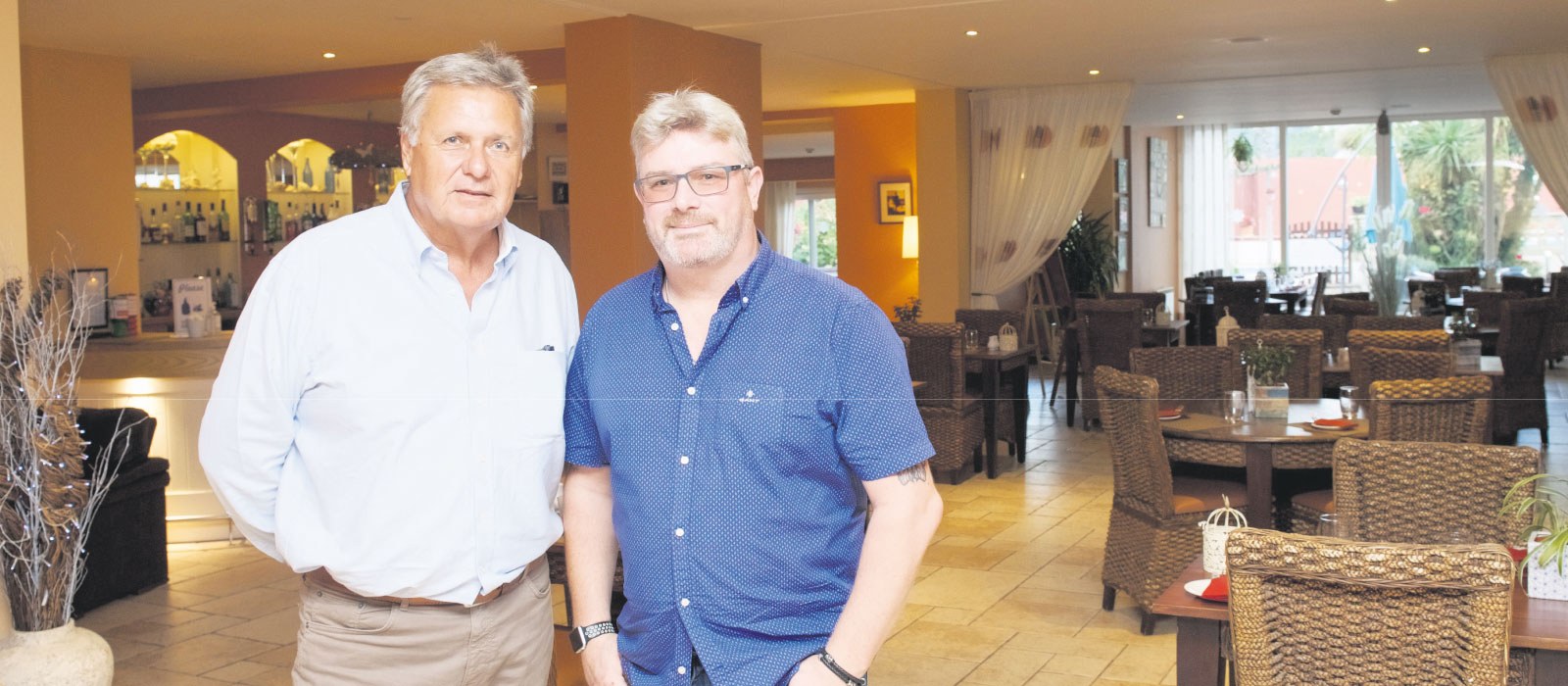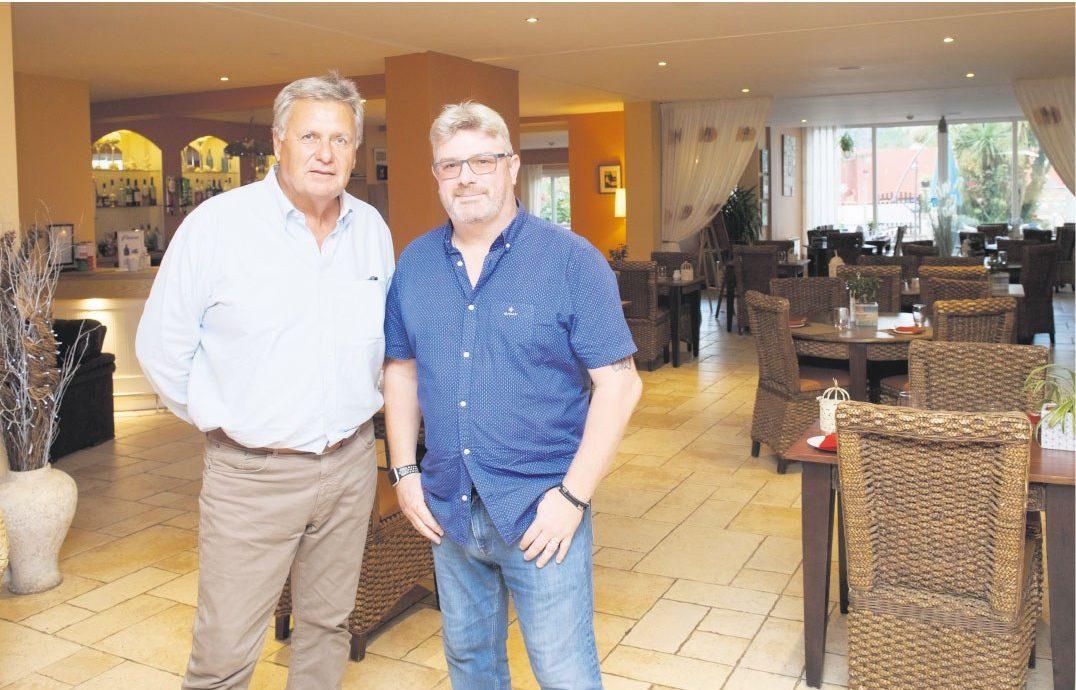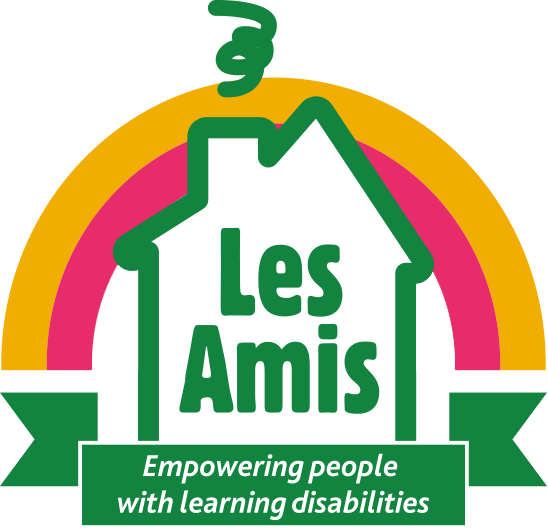
The Saturday Interview with Shaun Findlay: Quality of Life to the End of Life
STANDING in front of the Hampshire Hotel on the corner of Val Plaisant and Byron Road, Shaun Findlay has a vision of how things will look in two years’ time. The hotel will present an even more appealing face than it does at present with additional green space to lift its appearance and help connect it with the surrounding townscape – it will offer first-class accommodation for its residents and raise the spirits of passers-by, he thinks. But Mr Findlay is not a hotelier or a spokesperson for the hospitality industry, and his clients are not looking for a weekend break or access to the Island’s visitor attractions. Instead, they want something the rest of us take for granted as we grow older – somewhere to call home. The vision of the managing director of Les Amis – one of Jersey’s largest charities which meets the needs of those with learning disabilities – takes its inspiration from the sheltered accommodation at the foot of Beaumont Hill. He sums it up neatly as ‘L’Ermitage for people with learning difficulties, meeting the needs of a client group he says might otherwise be overlooked. Five times more likely to develop dementia or similar conditions, enjoying a life expectancy 20 years shorter than average and prone to undiagnosed medical conditions, those with learning disabilities present specific challenges to society as they grow older. Mr Findlay says Les Amis approached the government seven years ago to ask them what they were doing for them – they had not thought about it, he says. ‘If we don’t do something for the people we support when they need us most, we’ll have to say goodbye. Statistically, people’s life expectancy is reduced if they move into care but our residents can’t stay at home because they are already in a registered home, so the law won’t allow that to happen. They end up getting farmed out to whoever will have them which is not the best end to your life. That’s why we started looking at a specialist service to allow people with learning disabilities to take advantage of something that you and I take for granted,’ he said.
This focus on the latter stages of life is a logical consequence of the charity’s impact with younger people since it was established in 1975 as Maison Variety to help those with learning disabilities move from institutional to community care. Originally with an annual budget of £100,000 and employing 11 people, Les Amis now employs some 200 at an annual cost of £7 million and operates 18 registered premises. Mr Findlay believes that the needs of their client group are much better understood today and that the stigma of having a child with a learning or intellectual disability has been greatly reduced. Mainstream education, further education and employment opportunities are now accessible but there is still a tendency to misunderstand the challenges which arise when old age and frailty become issues.
He said: ‘We recognised that seven years ago when we started to do studies of people we supported. We knew by 2030 that over 70% of people we support would be over the age of 50 and it concerned us because the Island was only starting to think about the hospital and that, as people were living longer, they were needing more support.’ Discussions with the government to try to identify suitable premises for a new facility on the basis of a gift or under peppercorn rent ground to a halt. The pandemic then provided what Mr Findlay describes as a ‘full stop’ but by then the charity had itself been empowered by a donation of £2.5 million from a private will trust. They met hotelier Chris Robin, who took over the Hampshire with his wife ten years ago, who agreed to sell the premises. By happy coincidence Mr Robin was himself involved in the Variety Club which built Les Amis’ original premises. Mr Findlay said: ‘We had gone from one building and grown organically to meet the needs of people with learning difficulties, and now we have gone back to where we started which is a larger provision done on a more sympathetic scale. The rooms will be bigger and the space will be bigger than what you would expect in a normal care home.
This enables people with learning disabilities to have one more move and then they don’t need to move again, so we’ll be able to give them that good ending that we’d all expect for anyone in society. ‘It’s not about profit margins – it’s about making a difference.’ In its new guise, the hotel will provide 31 beds, some in apartments at the front with their own separate entrance and others in facilities behind which provide greater care for those clients who need it – allowing them to be independent for as long as they can be.
According to Mr Findlay, it will retain some of its existing associations in the transformation. ‘We want people to walk past the building and say “wow, that’s a beautiful block of apartments”. And when they go in to say “isn’t this a nice hotel”. People with learning disabilities need to be understood as human beings. ‘The unit will be somewhere you can move into in your 50s because we know it’s when we start to see ailments and illnesses beginning to progress but the residents will have the confidence that they won’t have to be shuffled around because they can come home and be cared for at home. That’s the vision of the unit,’ Mr Findlay explained. It is a vision which addresses a gap which Les Amis identify for those who, because of their disability, cannot make their own plans for changing physical needs as time goes on. Mr Findlay recalls one client who was moved out of a care home because of her particular disability and was transferred to hospital for nursing care because there was no alternative available to her. ‘She never got to leave hospital and ended-up dying there when she should have come home and been with the people she would have considered her family,’ he explained. The tale is typical of what Mr Findlay calls the ‘rubbing spots’ that exist for a client group which often presents a square peg to the round hole provided by the care system. ‘We have said to the government, you have built a model that makes the assumption that I will have a pension and money and assets but everyone we support will have none of that; so where do they get their co-payment to pay for the running of care homes or the additional money where the long-term level four payment doesn’t meet the needs of an individual? We can’t say to a customer give us more money because they don’t have any to give,’ he said. While the trust donation has given Les Amis the confidence to undertake the new project, it is still dependent on fundraising. That has been boosted by a gathering momentum which this week saw completion of the design brief which will go to the planning department, further evidence to offer those who might be potential funders.
Applications have already been made to funding bodies, and Les Amis are confident that they will have 75% of the capital required upfront. It leaves a fundraising target of more than £2 million which they are looking to fill from individual and corpporate donations. A page on the lesamis. org.je website gives further details. In the coming months, the charity is hoping to hold a final corporate event at the Hampshire Hotel which will be rather different to anything previously held there. It will demonstrate to hotel staff and to others interested in the project that the closure of this particular establishment should not be regarded as the end of an era as much as the beginning of a story that will take the Hampshire into a new one. This is, Mr Findlay says, the opportunity in an Island filled both by ‘the haves’ and the ‘have-nots’ for the former to make a very worthwhile contribution to the quality of life of some of the most deserving of the latter. His appeal is a very direct one. ‘Imagine you were sat at home looking after a relative and all you had were shades of grey because there was uncertainty over how their end-of-life was going to be. Imagine you were offered a distinct future for the individuals in that position, put yourself in their shoes and ask what that would mean for you or your family member. ‘We plan for our retirement but this is about people who don’t necessarily have the means or the ways to do that. If you can help us achieve that, it is not only going to benefit you and your family but this Island. This is about quality of life to the end of life and what we want for our residents is a good ending. ‘That’s what we all want – we all come into the world in the same way and we all go out the same way.

Donations
Please choose how your donation is to be paid:










